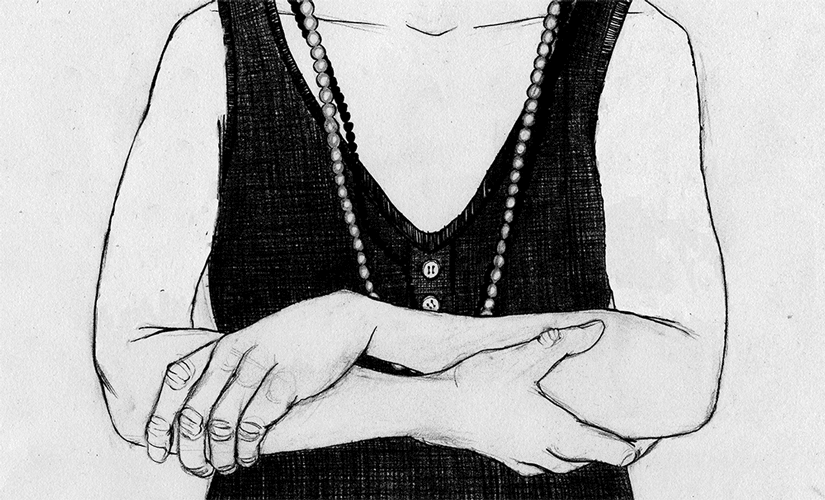A relative is pregnant.
Again.
Naturally the bubbes and zaydes are thrilled. Everyday and everything is “baby this” and “baby that.” When’s the baby due? I wonder what they’ll name the baby? Erin, when are you going to have a baby?
Ugh.
As a married woman of childbearing age, I’m besieged by babies. All of my married friends have at least one. Commercials, television, and movies all tell me motherhood is meant for me, and trying to find a synagogue? Oy! “You’ll just love our new pre-K program! Do you have any children?”
Not a month goes by when someone doesn’t ask when I plan on getting pregnant.
I am not pregnant, and I never will be… but that’s not the answer anyone wants to hear.
I’ve tried answering the “When will you give us a new Jew or two?” question honestly, but admitting I’m simply too sick to bear more “chosen” children makes others uncomfortable.
Predictably the placatory responses come: “Don’t worry. My brother’s sister’s cousin’s aunt in Milwaukee had chronic illness like you, and she tried for 12 years and finally got pregnant!” or the ever-popular, “Can’t you just do IVF?”
Rather than argue or educate, lately I’ve just lied.
“Okay, yeah. I’ll think about that.”
Because lying is easier than explaining to these people that not everything has a work-around, and even if it did, sometimes the physical, emotional, and financial cost is just too great.
This is especially true when you have a rare disease, as I do, that has no cure and requires visits to doctors across numerous specialties. What I have is called Fluoroquinolone Associated Disability (FQAD), a debilitating systemic reaction to an extraordinarily powerful class of antibiotics. You know those drug commercials where they say, “Serious infections, sometimes fatal, as well as certain cancers, kidney, and liver failures have happened”? Yeah, they aren’t kidding. Some medications can cause irreparable injury, and Fluoroquinolones damaged my central, autonomic, and peripheral nerves. In layman’s terms, that means chronic pain, organ dysfunction, and symptoms of brain damage including insomnia, tinnitus, and visual impairments.
You can see why adding an infant to that mix is not a recipe for success.
When I kvetch to my fellows in the chronic illness community, the responses are universally the same: Don’t be ashamed of your illness; don’t lie! If you lie they will never be educated about this issue!
But I don’t want that responsibility. I don’t want to carry the burden of other people’s ignorance on my back.
I have enough to deal with without having to tell the world why my reproductive functions and my finances (IVF, adoption, raising children, and chronic illness are all ridiculously expensive) are none of anyone’s damned business.
I don’t want to have to explain to you why it’s insensitive to ask a woman — any woman, sick or not — when she’s going to have kids. I don’t want to have to prove to you that my illness really is bad enough that pregnancy, even with modern technology, just isn’t in the cards for me.
I don’t owe you an explanation.
To the marrow of my bones, I recognize that I am right and righteous in my reproductive choices. But despite knowing what my body is and is not capable of, and having accepted that this is the path my life has taken, in my childlessness, I feel completely alone. And judged.
Children are the expectation. That I can’t, won’t, and have come to a place in my life where I don’t even want to procreate is treated as such an alien concept that many simply stare at me as if I had two heads.
And those gawkers — whether they know me personally or not — are never shy in their attempts to convince me that I am wrong, that my infertility is a moral failing of some kind, that if I just tried harder or investigated further or prayed to their god that everything would fall into place.
I’d be lying if I said I hadn’t cried about my childlessness. I’d be lying if I said I hadn’t considered those “arguments” put before me: that having kids is where it’s at, and you’re simply not living your best life if there isn’t a toddler or two attached to you.
I’d be lying if I said that I didn’t wish childlessness was an intellectual choice, rather than a physical necessity. And I’d be lying if I said I didn’t cry because the whole situation — the entirety of my illness — makes me feel robbed of my autonomy: hopeless, powerless, and broken.
I am the first in my immediate family to have chronic illness, so no one in my bloodline understands how lonely and isolating it can be. And you know what? It’s fine not to be able to fully understand. What’s not fine is to come at me from a place of judgment, devoid of empathy.
I’ve come to a place where I am comfortable with my decision to remain childless — to not pursue expensive options that require risking multiple miscarriages, taking fertility meds, IVF, and sacrificing some animal somewhere on the Altar of Motherhood. And I have come to a place where I am no longer going to lie when some bullying bubbe takes it upon herself to suggest I have a kid or four.
When the new baby in my family arrives, I will love him/her wholeheartedly, but on that day — and any day before or after — I best not be asked when my turn’s going to come.
Because I’m pretty sure the asker’s not going to like my answer.
Header image via Giphy.



